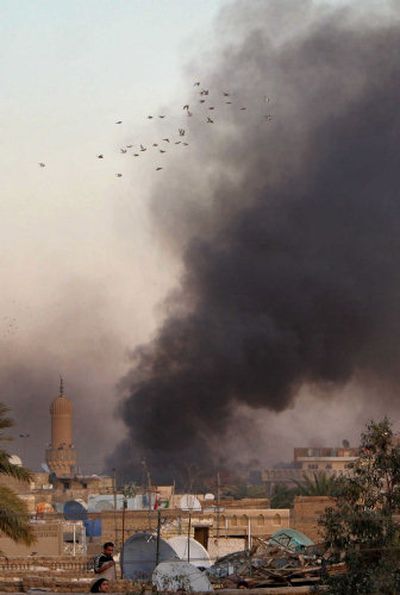Death squads within Iraqi government confirmed

BAGHDAD, Iraq – Senior Iraqi officials Sunday confirmed for the first time that death squads composed of government employees had operated illegally from inside two government ministries.
“The deaths squads that we have captured are in the defense and interior ministries,” Minister of Interior Bayan Jabr said during a joint news conference with the Minister of Defense. “There are people who have infiltrated the army and the interior.”
Also, Sunday, a series of deadly attacks hit the Shiite Baghdad neighborhood of Sadr City, which had recently been relatively safe, initiating another round of sectarian killings and threatening to provoke more.
Seven car bombs were left in markets around the poor Shiite area. Two exploded at 5:30 p.m., another at 5:35 p.m., two at 5:40 p.m. in a different market, and one at 5:45 p.m. Police found and defused the seventh.
The blasts, set off at the busiest time of the day just after poor residents would have returned from their jobs, yet before curfew, killed 46 people and wounded another 204. By Sunday night, the suburb of 2.5 million had been sealed off by police and the private militia of radical cleric Muqtada al-Sadr, the Mahdi Army.
The targeting of Sadr City could provoke a strong political backlash. Sadr City is a bastion of support for al-Sadr, a key backer of Prime Minister Ibrahim al-Jaafari’s bid for re-election. Al-Jaafari’s nomination is strongly opposed by Sunni and Kurdish leaders, although he is supported by United Iraqi Alliance, the Shiite political bloc that is the largest in parliament.
The Mahdi Army was also extremely active in attacks on Sunni mosques in the aftermath of last month’s bombing of a key Shiite shrine in Samarra that touched off a wave of sectarian killings.
Elsewhere around Baghdad, a series of roadside bombs and gun attacks killed another 17 people.
Interior Minister Jabr said that investigations into death squads were still ongoing in the Defense Ministry. He said the Interior Ministry had arrested 22 people, and subsequently released 18 as innocent after interrogation, detaining four for further questioning.
“Now we have sent them (the four) to the court because it hasn’t been proven that all four were involved,” Jabr said. “Although I did not have clear signs (of their guilt) I sent them to the justice ministry so that the law could be carried out.”
Although Jabr appeared to confirm the existence of death squads, the scale of the operation uncovered would appear to be far smaller than critics had alleged.
Sunni Muslims have long complained about Shiite death squads that arrived wearing official uniforms and rode in official-looking vehicles to haul away victims.
The government had long denied the existence of such death squads. Sunnis had accused the Badr Organization, a Shiite militia supported by Iran, of being behind the killings, inside or outside of government ministries. Jabr is a senior leader of the Supreme Council for Islamic Revolution in Iraq, a leading Shiite political party, and has close ties to the Badr Organization.
A spokesman for President Jalal Talabani said Iraq’s political parties would meet Tuesday to resolve differences and would convene the first parliamentary session Thursday, three days ahead of what had been planned.